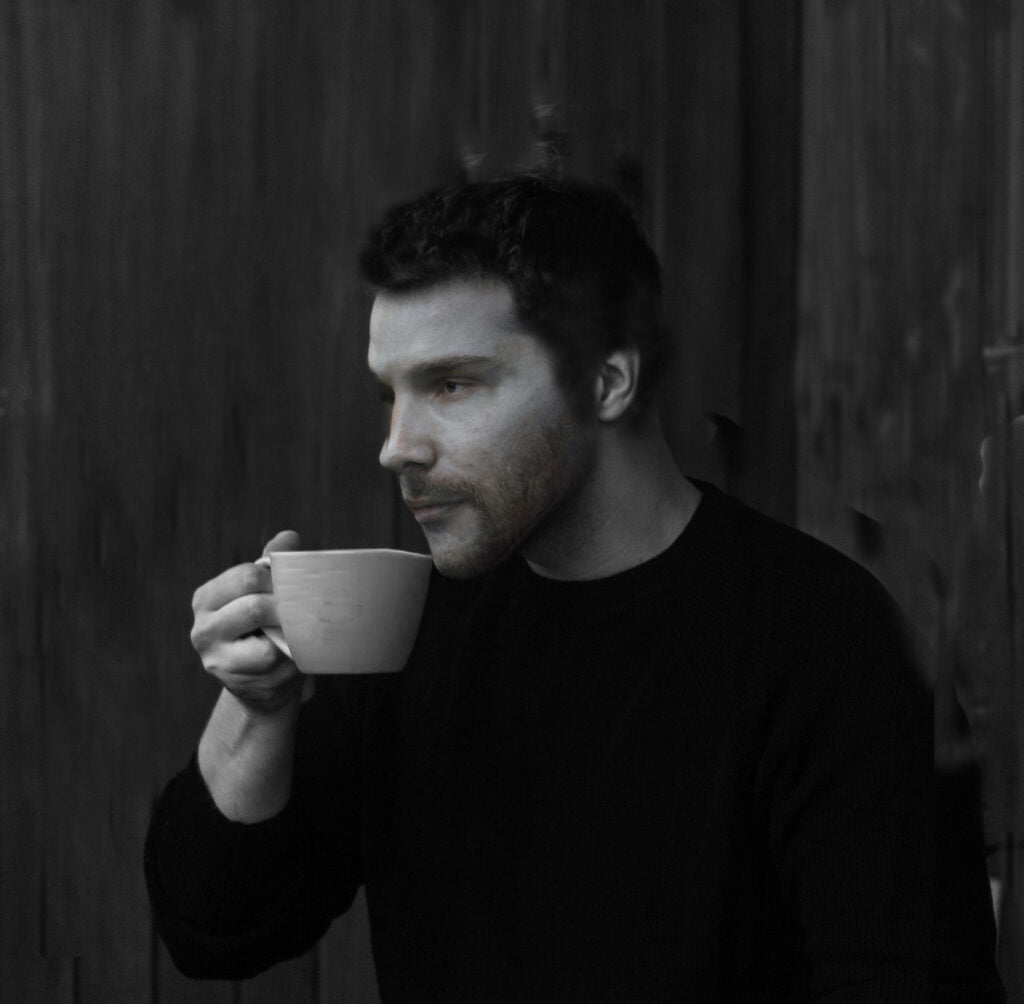Coffee always has some bitterness in taste and that’s why it is not liked by many people in the world.
Regular coffee drinkers actually love bitterness if it is balanced. But too much bitter coffee can also turn off the mood of coffee lovers.
The good news? With some clever tweaks and pro tips, you can take the bitterness out of your coffee
Key Takeaways
- Choose 100% Arabica beans with medium or light roast
- Reduce the coffee-to-water ratio to make a mellow cup of coffee
- Switch to the Drip or Pour-over method instead of Espresso or French press
- Always use the right water temperature for brewing (195-205 degrees)
- Add small amounts of salt or cinnamon to mask the bitterness
Why is your Coffee Bitter?
There are many reasons why your coffee tastes excessively bitter, including poor bean quality, incorrect brewing technique, over-extraction, and high brewing temperatures.
Let’s discuss all the reasons in detail.
1. Bad Beans
Many low-grade, poorly roasted coffee beans are available in the market at comparatively low prices.
So, if you can’t compromise on the taste of coffee, it would not be fair to compromise on the prices. Always buy good quality and perfectly roasted beans.
If you are too sensitive to bitterness and hate it completely, you must buy light or medium-roasted coffee beans; it’s less bitter than dark-roasted coffee beans.
Also, use 100% Arabica coffee beans. Many coffee beans present in the market are a blend of Arabica and Robusta beans so always check the labeling carefully.
Robusta beans are higher in caffeine and also have a more bitter taste. While Arabica beans are smoother with a rich and aromatic flavor.
Also, avoid Instant coffee as it is more bitter compared to fresh coffee grounds!
2. Bad Brewing technique
The taste of the coffee can become bitter if you make mistakes during brewing. Following are some mistakes that you should avoid.
- Time: The taste of the coffee gets more and more bitter if you increase the time for brewing.
- Size of ground coffee beans: If your grind size is too fine, then your coffee may taste bitter.
- The temperature of the water: If you use too much hot water for brewing your coffee, it will make the taste of the coffee more bitter.
- Dirty Equipment: Improper cleaning of a coffee maker leads to over-extraction of leftover beans, which causes bitterness in taste.
- Amount of water: You must always use the perfect water and coffee beans ratio to avoid bitterness.
what to add to coffee to make it less bitter
Here are some items you can add to remove bitter taste from coffee.
1. Adding sugar or creamer
Adding sugar, milk, or creamers to coffee can reduce the bitterness and make the taste sweet and creamy. You can add frothed milk to coffee to make delicious Latte and Cappuccino drinks.
But this solution comes at the cost of added calories in the cup of your coffee. So, if you are very diet conscious that solution might not be for you.
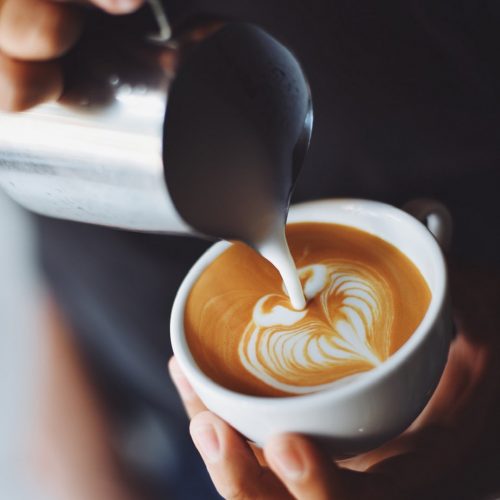
2. Adding salt to ground coffee beans
If you want to make coffee less bitter without adding extra calories from the sugars of creamers; Sprinkle a small amount of salt over your coffee grounds before brewing. You will surely notice a reduction in the bitterness of the taste.
Just a pinch will do the trick, don’t add too much salt otherwise your drink will taste weird!
The sodium ions in salt interact with the bitter molecules in coffee and make the taste more approachable and mellow.
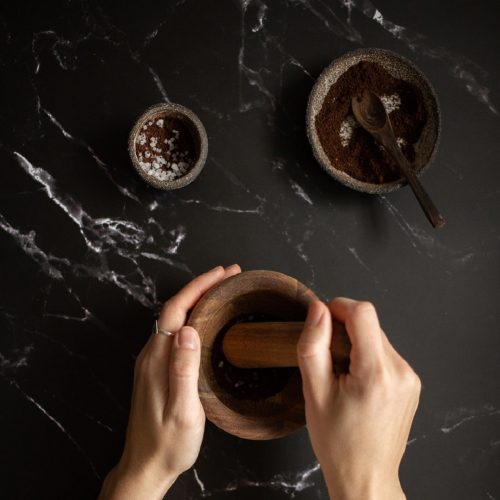
3- Add some citrus
Adding some drops of lemon or orange juice can significantly remove bitterness from coffee. If you don’t want the citrus taste of lemon or orange in your coffee then a simple slice of lemon or orange rind can also do the trick.
The acids in the citrus fruits neutralize the bitterness and make your drink smoother.
6 ways to make coffee less bitter
Here are some expert tips to correct bitter Coffee!
1. Use perfectly ground Coffee beans
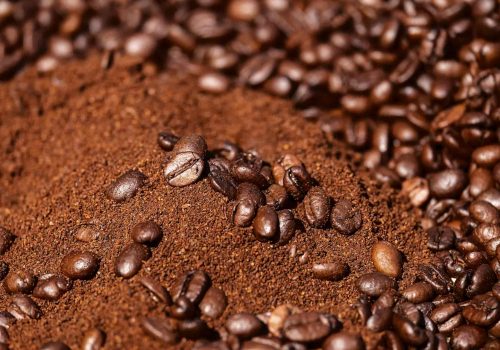
When it comes to the grind size of coffee. SIZE MATTERS!
If it’s too fine, the taste of the coffee gets bitter because of the over-extraction of the bitter flavors of the coffee beans.
And if it’s too coarse, the beans don’t get appropriately extracted, and your coffee will taste too weak or watery.
So, the question here is, what will be the ideal size of ground coffee beans?
Well! The answer is not that simple; it also depends on the type of coffee you are making.
Fine coffee grounds are used for making Espresso because of the pressurized and speedy brewing process.
Medium coffee grounds are used in pour-over or Drip coffee makers. While for French press coffee and cold brew coffee coarse grounds are perfect.
So, the size of the beans entirely depends on the type of coffee you are making. Generally, go a little coarser if you want to take the bitterness out of coffee.
I have written a detailed guide on coffee grind sizes. You will get complete information about what grind size is perfect for what type of coffee drink. Make sure to check it out.
2. Clean your coffee maker
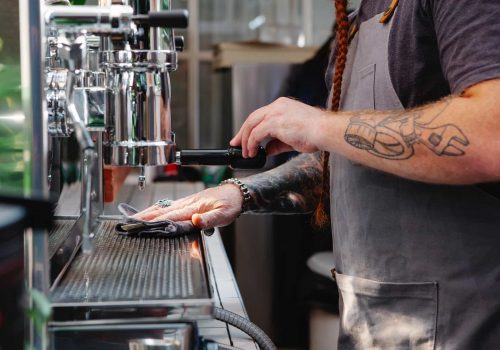
A dirty coffee maker will never allow you to brew your coffee perfectly. It’s always recommended to clean your coffee maker right after brewing.
The extraction of old coffee grounds present in your coffee maker can make your drink overly bitter.
It’s easiest to clean your coffee maker right after brewing because as time passes, the coffee dries, and it sticks harder on the surface of the coffee maker.
Sometimes you are in a hurry and forget to wash it as soon as you brew the coffee. And the coffee beans get dry and stick to the surface of the coffee maker. In that case, you will need baking soda to clean the coffee maker.
3. Water quality and temperature
If the quality of the water isn’t good your coffee will definitely taste bad. Brewed Coffee is 98% after all!
Always use filtered water for brewing the coffee as it contains just the right amount of minerals to bring out maximum flavors from your beans.
The temperature of brewing water also matters. If you are using boiling water for brewing your coffee will definitely taste bitter.
The reason is coffee extracts more bitter flavors at higher temperatures.
According to SCA, The ideal temperature for brewing coffee is 195-205 degrees and the boiling point of water is 212 degrees.
So allow the water to cool for 30 to 40 seconds after boiling.
4. Time for brewing
The time for brewing the coffee has a considerable effect on the taste of coffee.
If you brew your coffee for too little time, the coffee beans will not get extracted properly, and your coffee taste will be sour and weak.
If you brew your coffee for too much time, you will over-extract the coffee beans, and the coffee will taste bitter.
So, it’s a must that you find the perfect time for brewing the coffee. The ideal time for brewing the coffee depends on the type of brewing method.
5. Change your brewing method
If you are drinking Pot Coffee or French Press, you should expect a bitter taste as they are strong brewing methods.
Drip coffee machines and pour-overs generally produce a smoother and less bitter cup of coffee due to shorter brewing time and the use of paper filters.
Check out a guide on different coffee brewing methods
6. Reduce Coffee to water ratio
Using too much coffee grounds for brewing coffee can lead to over-extraction and harsh, bitter flavors.
The Golden cup ratio for brewing Drip or Pour-over style coffee is 1:17. That means around 15 grams of coffee grounds for a single serving. This ratio will give you the best flavors without being overly bitter.
Here’s a detailed guide on coffee water ratios for making coffee
Final Thoughts
It is the bitterness of coffee that gives it its unique and complex flavor.
So, if you’re looking for a truly authentic coffee experience, don’t expect it to be completely free of bitterness. But it’s over-bitterness that causes the problem.
I hope the above-mentioned tips will help you to fix bitter coffee.
If you know any other trick, do let us know in the comments!
FAQs
Is Coffee meant to be bitter?
Yes, coffee is inherently meant to have some degree of bitterness. The natural acids, caffeine, tannins, and polyphenols that give coffee its complexity also impart varying levels of bitterness.
Well-balanced coffee showcases bitter notes mingling with aromatics, fruitiness, and sweetness, but it shouldn’t be overly bitter.
What spice makes coffee less bitter?
Using a small amount of ground cinnamon is another great way to help balance and mask bitterness in coffee.
Cinnamon adds subtle sweetness and warmth to coffee, counteracting the bitterness and improving the flavor profile.
Is it OK to put honey in coffee?
Adding a bit of honey to coffee is an easy way to add sweetness that counteracts bitterness. However, honey has very strong flavors that can overpower the flavors of coffee.
Does Decaf coffee have less Bitterness?
Yes, decaf coffee tastes slightly less bitter than regular caffeinated coffee. However, caffeine itself is only responsible for a small fraction of coffee’s overall bitterness. The majority comes from chlorogenic acid lactones and phenylindanes that remain unaffected by decaffeination.
Other Interesting Articles:

